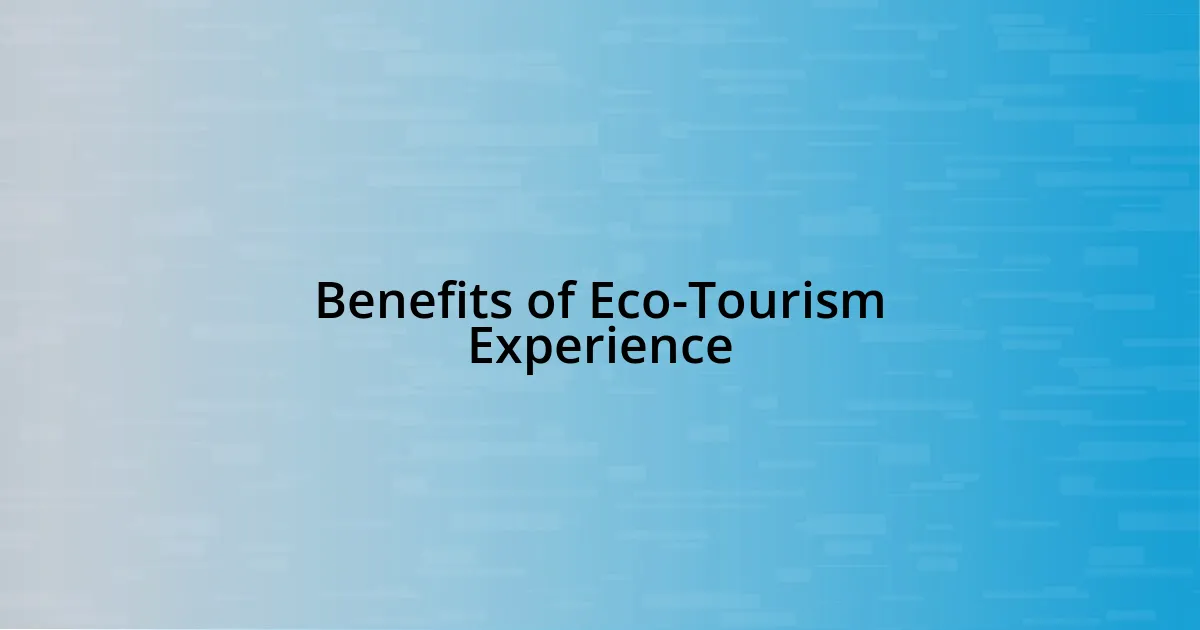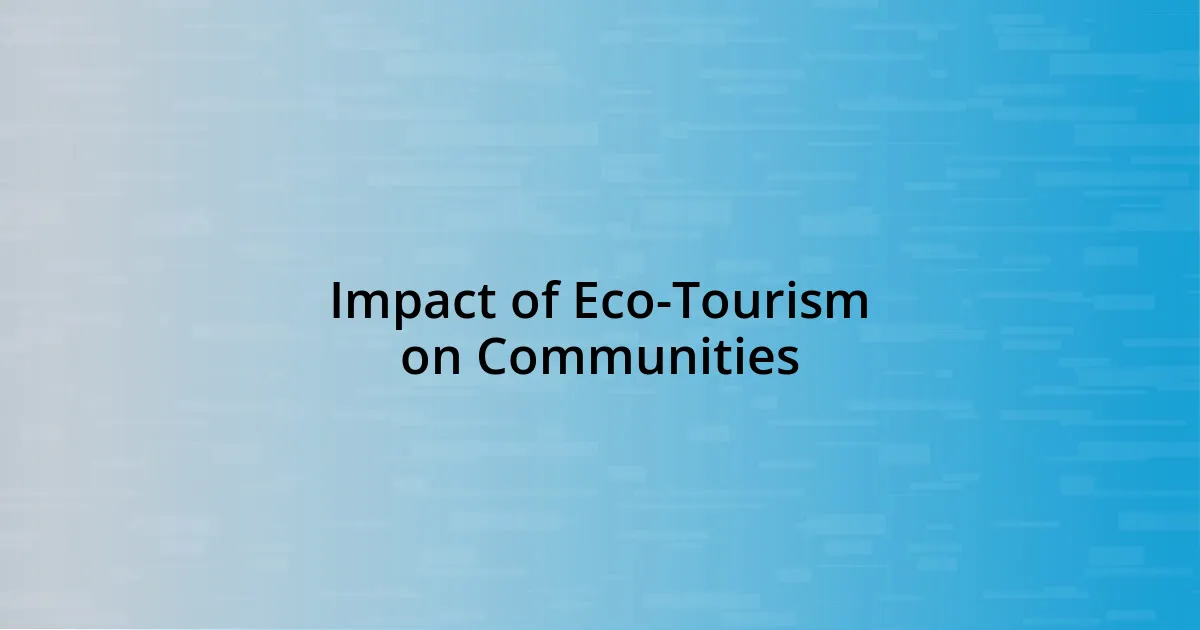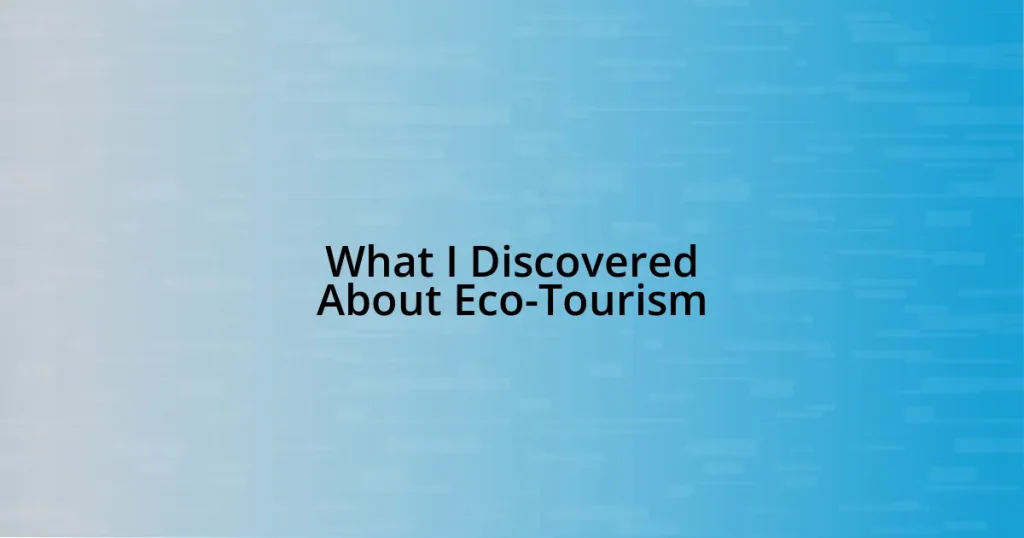Key takeaways:
- Eco-tourism emphasizes sustainability, conservation, and community support, enhancing travelers’ connection to the environment.
- Engaging in eco-tourism empowers local economies, preserves cultural heritage, and fosters environmental stewardship among communities.
- Choosing eco-friendly destinations and practices, such as local lodging and transportation, contributes to a more mindful travel experience.
- The future of eco-tourism includes technology-driven sustainable experiences, regenerative travel, and community-led initiatives that create positive legacies.

Understanding Eco-Tourism Basics
Eco-tourism goes beyond just enjoying nature; it’s about forging a deeper connection with the environment and supporting local communities. I remember my first eco-tour: standing in a lush rainforest, I felt an overwhelming sense of responsibility. It prompted me to think — how often do we consider the impact our travel has on these beautiful, yet fragile ecosystems?
At its core, eco-tourism emphasizes sustainability and conservation. I often wonder, what does it mean to travel responsibly? For me, it means choosing experiences that not only minimize environmental damage but actively contribute to the preservation of nature. So, when I visited an eco-lodge that sourced its materials from local suppliers, I felt a sense of pride knowing my visit helped support the community.
Understanding eco-tourism also involves recognizing its principles: minimizing your carbon footprint, respecting wildlife, and promoting cultural sensitivity. I still vividly recall observing wildlife from a distance on a guided tour, which allowed me to appreciate creatures in their natural habitat without intruding. It underscores the importance of knowledge and respect in every adventure we undertake.

Benefits of Eco-Tourism Experience
One of the most rewarding aspects of eco-tourism is the immersive experience it provides. When I traveled to a remote village in the Amazon, I was not just a visitor; I became part of a community that lived harmoniously with the land. This connection allowed me to witness firsthand how tourism can empower locals, providing them with economic opportunities while encouraging the preservation of their cultural heritage. It’s gratifying to know that my travel dollars directly supported the community’s wellbeing and sustainability efforts.
Here are some benefits of the eco-tourism experience:
- Environmental Conservation: Engaging with conservation projects often leads to a deeper appreciation of the ecosystems we explore.
- Cultural Exchange: Immersing myself in local customs and traditions has enriched my understanding of the world.
- Personal Growth: Every eco-tour brought new challenges, whether it was hiking through rugged terrain or learning traditional crafts, fostering resilience and creativity.
- Community Support: Knowing that my choices directly benefit local economies gives a sense of fulfillment that standard tourism experiences often lack.
- Mindfulness: The tranquility of nature encourages a reflective mindset, helping me unwind and reconnect with what truly matters.

Choosing Eco-Friendly Destinations
Choosing eco-friendly destinations requires some thought and research. When selecting a location, I always look for places that prioritize sustainability and have clear conservation efforts. For instance, I once planned a trip to a coastal town that actively worked on preserving its marine life through eco-friendly practices. Knowing that my visit directly supported these initiatives was incredibly fulfilling and made my experience even more enjoyable.
Another vital aspect to consider is the local community’s involvement in eco-tourism efforts. During my travels in Costa Rica, I was inspired by how local guides shared their knowledge about the rainforest and its inhabitants. This not only educated me but also highlighted the importance of supporting local businesses that are committed to eco-friendly practices. By engaging in tours led by locals, I felt connected to their passion for preserving their environment and culture.
Lastly, it’s essential to think about the environmental policies of potential destinations. I have found that visiting national parks with strict regulations on wildlife interaction keeps the ecosystem thriving. I once hiked through a park that limited the number of visitors, allowing nature to flourish undisturbed. This thoughtful approach made my experience immensely rewarding, as I felt a part of something bigger—an ongoing effort to protect our planet.
| Destination | Eco-Friendly Practices |
|---|---|
| Coastal Town (example) | Marine life preservation, sustainable tourism initiatives |
| Costa Rica | Local guide employment, cultural education, eco-lodging options |
| National Park (example) | Visitor limits, strict wildlife regulations, conservation programs |

Practices for Sustainable Travel
When embracing sustainable travel, I’ve found that making conscious choices can truly transform the experience. For example, during my time in a vibrant eco-village, I opted for lodging that was entirely solar-powered. Wasn’t it incredible to know that my stay was not only comfortable but also left a minimal carbon footprint? It felt empowering to support a system designed with the environment in mind.
One of the standout practices I’ve adopted is relying on local transportation. In a charming town in Thailand, I chose to explore the area on a bicycle instead of a car. This choice allowed me to soak in the beauty of the surroundings at a leisurely pace while also engaging with locals who waved or smiled as I passed by. It’s moments like these that remind me how slow travel fosters deeper connections and a greater appreciation for the places we visit.
Eating locally grown food is another essential practice I cherish. On a memorable trip to a small Greek island, I dined at a family-run taverna that sourced all its ingredients from nearby farms. The freshness was unmatched, and each bite felt like a celebration of the island’s rich traditions. How often do we think about where our food comes from while traveling? Supporting local agriculture not only nourishes our bodies but also bolsters the community and keeps their culinary heritage alive.

Impact of Eco-Tourism on Communities
During my travels, I’ve seen firsthand how eco-tourism can breathe new life into local communities. In a small village in the Amazon, I witnessed how the introduction of eco-lodges created jobs for residents. It was heartwarming to see how local families embraced this opportunity, sharing their traditions and stories with visitors while preserving their cultural heritage. Have you ever thought about how your trip could directly change lives?
I’ve also noticed that eco-tourism encourages communities to take pride in their environment. For instance, while hiking in a remote area of the Andes, I was struck by the local initiatives focused on preserving the landscape. Villagers organized clean-up days and environmental education workshops, empowering their youth. It made me reflect: isn’t it incredible how tourism can ignite a sense of responsibility and stewardship in a population?
Beyond economic benefits, the impact of eco-tourism often fosters a sense of community resilience. I remember chatting with a local artisan in a coastal town of Bali, who expressed gratitude for the influx of travelers interested in handcrafted goods. This support not only sustained her family but also encouraged younger generations to learn traditional crafts. The joy in her eyes made me realize how eco-tourism goes beyond just financial support—it’s about nurturing a culture and a way of life that could otherwise be lost.

How to Support Local Economies
When traveling, I’ve learned that supporting local economies can be as simple as shopping at markets run by local artisans. During my visit to a vibrant crafts fair in Mexico, I struck up conversations with the vendors, who were eager to share the stories behind their creations. Each purchase not only adorned my home with unique artwork but also directly contributed to their livelihoods—how fulfilling is it to think that your travel dollar can resonate so deeply?
Dining at locally-owned eateries has also become a staple of my travels. I recall a delightful dinner at a small family-run café in Portugal, where the owner prepared traditional dishes using recipes passed down through generations. The warmth of the atmosphere and the flavors were unforgettable, and it struck me how supporting such businesses helps maintain the culinary traditions of a region. When was the last time you savored a meal that felt like a cultural experience?
Additionally, participating in local tours led by community members can offer incredible insights into their way of life while boosting their economy. On a fascinating tour led by a local guide in Kenya, I learned about their customs, wildlife preservation efforts, and the importance of sustainable tourism. His passion was contagious, and I realized that by joining these experiences, I was not only enriching my own journey but also empowering his community. Isn’t it inspiring to think about how these moments of connection can create lasting impact?

Future Trends in Eco-Tourism
As I reflect on the future of eco-tourism, one trend stands out: the growth of technology-driven sustainable experiences. I recently tried an augmented reality tour in a nature reserve, where my smartphone brought the landscape to life with information and stories of the environment. It made me think, how can technology enhance our connection to nature while preserving it?
Another compelling direction is the rise of regenerative travel, which goes beyond sustainability. During my hiking trip through certain restored ecosystems in Scotland, I was amazed to learn how tourists were actively participating in rewilding efforts. I felt a deep sense of purpose knowing that my visit contributed to restoring natural habitats. What if each trip could help heal the planet?
Lastly, I see a significant shift towards community-led tourism initiatives. On a visit to a cultural village in Africa, I found myself immersed in a community project that involved tourists in local conservation efforts. I was struck by how the residents not only showcased their culture but actively sought to protect their environment. Have you ever wished your travels could leave a positive legacy? This emerging trend might just offer that opportunity—making us not just visitors, but meaningful contributors to the places we explore.















